Veranstaltungen und Aktivitäten
Join the DIJ team as librarian (application deadline: 1 December)
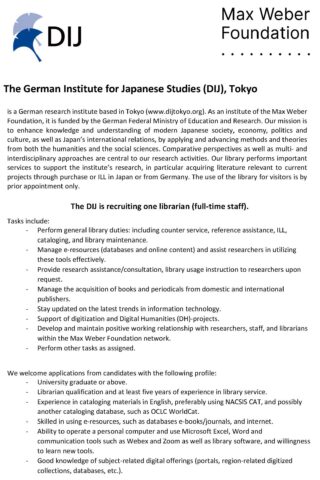 We are recruiting one librarian for our DIJ library. Tasks include general library duties, managing e-resources, research assistance/consultation and library usage instruction to researchers, and the acquisition of books and periodicals from domestic and international publishers. We welcome applications from qualified candidates with a university degree, librarian qualification, at least five years of experience in library service, experience in cataloging materials in English and in using e-resources, such as databases e-books/journals, and internet. The successful candidate should be able and willing to run the library as sole librarian. Applicants must be fluent in English and in Japanese, and preferably German. They must either have Japanese nationality or otherwise be in possession of a Japanese working visa. The employment would be first on a two-year basis, preferably starting on March 1, 2025, with the option of a permanent position thereafter, if certain conditions are met. Individuals interested in this position are invited to submit a cover letter stating their motivation for this position and CV in English via our online application system no later than December 1, 2024. Please see the full job advertisement in English and in Japanese
We are recruiting one librarian for our DIJ library. Tasks include general library duties, managing e-resources, research assistance/consultation and library usage instruction to researchers, and the acquisition of books and periodicals from domestic and international publishers. We welcome applications from qualified candidates with a university degree, librarian qualification, at least five years of experience in library service, experience in cataloging materials in English and in using e-resources, such as databases e-books/journals, and internet. The successful candidate should be able and willing to run the library as sole librarian. Applicants must be fluent in English and in Japanese, and preferably German. They must either have Japanese nationality or otherwise be in possession of a Japanese working visa. The employment would be first on a two-year basis, preferably starting on March 1, 2025, with the option of a permanent position thereafter, if certain conditions are met. Individuals interested in this position are invited to submit a cover letter stating their motivation for this position and CV in English via our online application system no later than December 1, 2024. Please see the full job advertisement in English and in Japanese
Hybrid DIJ Study Group on Yakushima’s Complex Layers of Realities
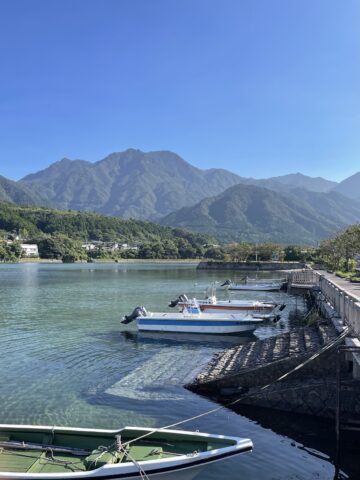
At first glance, the island of Yakushima presents an appearance of peaceful stability, that of a nature preserved from human influence, embodied by millennial cedars. Yet, beneath this layer other realities emerge – different ways of inhabiting and transforming this territory by various stakeholders at different times. These complex layers raise questions about their potential interactions and the risks of disruption. In other words, how can the different stakeholders living on the island continue to coexist in a sustainable way? Referring to locals and their activities (tourism, industry, forestry, etc.), tourists, non-human animals, plants, all other forms of living entities, kami and other beings of the supernatural world, as well as symbols, this presentation aims to better understand how these relationships form a cohesive collective, which could be described as an eco-semiosphere. Details and registration here
New issue of Contemporary Japan published
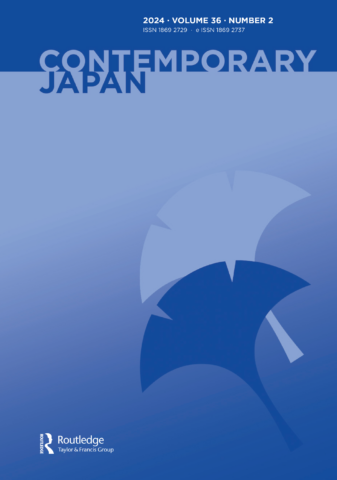
The new issue of Contemporary Japan (vol. 36, no. 2) features five research articles, the biennial 2023 VSJF award-winning paper, and a book review section. The research articles include an inquiry into the relevance and effectiveness of national apologies by Jane Munro; Ryotaro Takahashi addresses the relationship of income inequality and the size of the government in Japan; Ken Hijino analyzes the politics of depopulation in local elections; Silvia Croydon investigates the politics of inclusiveness in terms of consultation on disability policies; and Kristina Iwata-Weickgenannt and Aidana Bolatbekkyzy explore how foodscapes are invoked in critical commentary on the “capitalocene” in post-3.11 Japanese literature. The English translation of the VSJF award-winning paper by David Adebahr offers unprecedented access to the conversations and thought processes behind Japan’s security policy among key political actors in Japan. CJ’s book review section includes recent publications on religion and fundamentalism, the history of Kyoto, public discourse on fertility policies, and the use of robots in eldercare.
New open access article analyses impact of civic engagement on women’s well-being
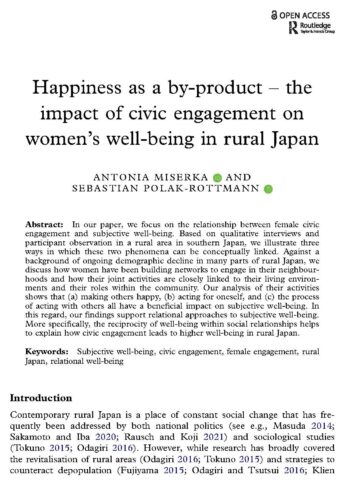 A new open access research article by Antonia Miserka (University of Vienna) and DIJ social scientist Sebastian Polak-Rottmann analyses the relationship between female civic engagement and subjective well-being. Their article „Happiness as a by-product – the impact of civic engagement on women’s well-being in rural Japan“, published in Japan Forum (online first), is based on qualitative interviews and participant observation in a rural area in southern Japan. The analysis shows that (a) making others happy, (b) acting for oneself, and (c) the process of acting with others all have a beneficial impact on subjective well-being. In this regard, the findings support relational approaches to subjective well-being. More specifically, the reciprocity of well-being within social relationships helps to explain how civic engagement leads to higher well-being in rural Japan. The article is an outcome of Sebastian’s research project Supplementing activities of resilience: The impact of demographic change on local activities and civic engagement.
A new open access research article by Antonia Miserka (University of Vienna) and DIJ social scientist Sebastian Polak-Rottmann analyses the relationship between female civic engagement and subjective well-being. Their article „Happiness as a by-product – the impact of civic engagement on women’s well-being in rural Japan“, published in Japan Forum (online first), is based on qualitative interviews and participant observation in a rural area in southern Japan. The analysis shows that (a) making others happy, (b) acting for oneself, and (c) the process of acting with others all have a beneficial impact on subjective well-being. In this regard, the findings support relational approaches to subjective well-being. More specifically, the reciprocity of well-being within social relationships helps to explain how civic engagement leads to higher well-being in rural Japan. The article is an outcome of Sebastian’s research project Supplementing activities of resilience: The impact of demographic change on local activities and civic engagement.
Book by Dolf Neuhaus on Korean-Japanese Interactions and Japanese Colonial Rule in Korea
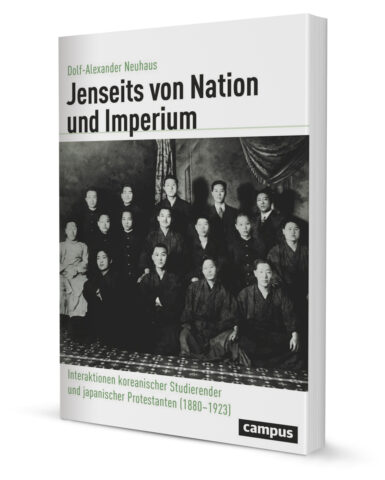
What role did Korean students who came to Japan between 1880 and 1923 play in the discourse on Japan’s colonial and East Asian policies? How did their encounter with Japanese intellectuals of Protestant faith, especially in the environment of the YMCA and the Imperial University of Tokyo, influence their views? Drawing on a wide range of Japanese and Korean sources, Dolf-Alexander Neuhaus‚ new book Jenseits von Nation und Imperium. Interaktionen koreanischer Studierender und japanischer Protestanten (1880–1923) (Beyond nation and empire. Interactions between Korean students and Japanese Protestants, 1880-1923) examines how these students and intellectuals discussed Japanese colonial rule in Korea and the ‚Korean question‘ and how their exchange of ideas influenced Japanese and Korean perceptions of empire, nation, and East Asia. The book is based on Dolf’s doctoral dissertation and is published by Campus in the Global History series.
DIJ co-organises VSJF Annual Conference on Sustainability in Japan
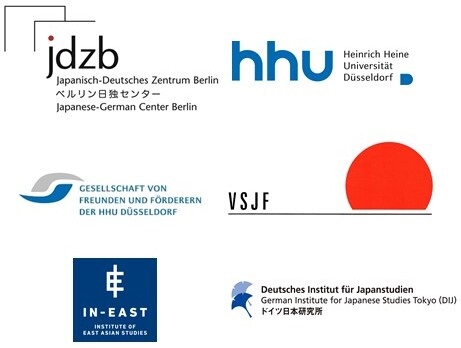 Making human activity on Earth sustainable is currently the greatest challenge of mankind. Ever since the United Nations adopted the Sustainable Development Goals (SDGs) in 2015, the topic has gained world-wide popularity, but what sustainability means, how it can be achieved, how it is politically negotiated, and which actors are involved differs widely across the world. Focusing on economic, societal, and political perspectives, the purpose of this conference is to gain a better understanding of how issues of sustainability are understood, framed and pursued by different actors in Japan. Speakers include DIJ researchers Franz Waldenberger, Barbara Holthus, Isaac Gagné, Sebastian Polak-Rottmann, and Nicole M. Mueller. The conference is co-organised by Barbara Holthus and DIJ alumni Harald Conrad (Düsseldorf) and Axel Klein (Duisburg). It takes places at the JDZB in Berlin from November 15-17, 2024. Details and registration here
Making human activity on Earth sustainable is currently the greatest challenge of mankind. Ever since the United Nations adopted the Sustainable Development Goals (SDGs) in 2015, the topic has gained world-wide popularity, but what sustainability means, how it can be achieved, how it is politically negotiated, and which actors are involved differs widely across the world. Focusing on economic, societal, and political perspectives, the purpose of this conference is to gain a better understanding of how issues of sustainability are understood, framed and pursued by different actors in Japan. Speakers include DIJ researchers Franz Waldenberger, Barbara Holthus, Isaac Gagné, Sebastian Polak-Rottmann, and Nicole M. Mueller. The conference is co-organised by Barbara Holthus and DIJ alumni Harald Conrad (Düsseldorf) and Axel Klein (Duisburg). It takes places at the JDZB in Berlin from November 15-17, 2024. Details and registration here
Hybrid DIJ Study Group on Looting of Post-Surrender Japan

Following the American conquest of Okinawa in June 1945, the Japanese military anticipated that the Allies planned to invade the four main islands of Japan. But to everyone’s surprise, no such invasion came. Instead, the war abruptly ended on August 15, 1945, without a single Allied soldier setting foot on mainland Japan. Between August 15 and late September 1945, morale and discipline within military units across Japan underwent a wholesale collapse. This talk explores how soldiers and sailors within Japan reacted to defeat during the critical weeks after Japan’s surrender. Using data from Japanese military police (Kenpeitai) reports, the talk argues that looting by demobilized servicemen and their officers profoundly tarnished the Japanese military’s reputation in the eyes of the public and severed what few bonds remained between the Imperial Japanese military and Japan’s people. Details and registration here
Hybrid DIJ Forum on ‚Omnilateralism in an Interpopular World‘
 After a century of Western-inspired and hackneyed multilateralism, its much criticized more than 75-year-old stronghold, the UN, needs a new narrative: interpopular omnilateralism. Instead of originating in the hardly definable construct of the “nation” and hence being “international”, the UN Charter is rather based on the people, thus it is interpopular from its inception. The proper vehicle to reach this aim of a wider community of people is omnibus – for and by all -, firstly, to widen the way for input of more ideas and good practices by non-Western people, and secondly, to include non-state actors as legitimate stakeholders in global governance. At this DIJ Forum, Wolfgang Pape will introduce the concept omnilateralism and discuss it in the context of democracy and global governance. Akio Kawato will offer his comments, followed by a Q&A session and a small reception. Details and registration here
After a century of Western-inspired and hackneyed multilateralism, its much criticized more than 75-year-old stronghold, the UN, needs a new narrative: interpopular omnilateralism. Instead of originating in the hardly definable construct of the “nation” and hence being “international”, the UN Charter is rather based on the people, thus it is interpopular from its inception. The proper vehicle to reach this aim of a wider community of people is omnibus – for and by all -, firstly, to widen the way for input of more ideas and good practices by non-Western people, and secondly, to include non-state actors as legitimate stakeholders in global governance. At this DIJ Forum, Wolfgang Pape will introduce the concept omnilateralism and discuss it in the context of democracy and global governance. Akio Kawato will offer his comments, followed by a Q&A session and a small reception. Details and registration here

















 Open Access
Open Access 
